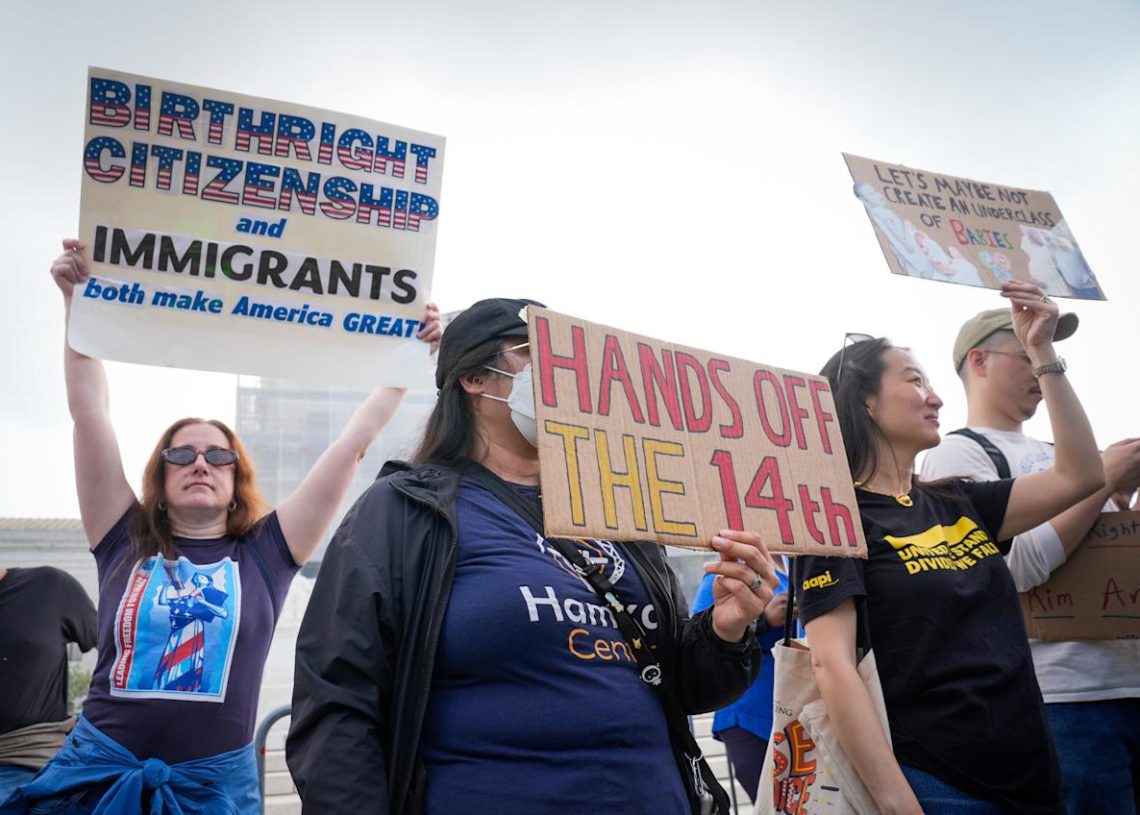WASHINGTON − The Trump administration on May 15 tried to convince the Supreme Court to let it broadly enforce the president’s new rules ending birthright citizenship for some, even though multiple lower courts have said his executive order is probably unconstitutional.
John Sauer, President Donald Trump’s solicitor general, told the justices it’s “extremely urgent” that the court limit judges’ ability to pause the president’s policies while they’re being litigated.
Several of the justices have expressed concerns about the use of nationwide injunctions, but Sauer faced pushback this week about whether limiting injunctions was appropriate in this case.
Trump’s order would end birthright citizenship for children born in the United States unless at least one of their parents is a U.S. citizen or legal permanent resident.
While the government said Trump’s policy should be in effect for anyone who doesn’t try to challenge it, some justices questioned the practical effects of that patchwork scenario.
And they suggested the administration avoided asking the Supreme Court to rule directly on the policy because they knew they would lose.
Here are the highlights from the more than two hours of oral arguments.
States warn there could be ‘unprecedented chaos’
Jeremy Feigenbaum, a lawyer representing the states challenging Trump’s policy, stressed the practical problems of not having a national standard for citizenship while the executive order is being litigated.
It’s never been the case, he said, that citizenship is turned off or on when someone crosses a state line.
“We genuinely don’t know how this could possibly work on the ground,” he said, describing it as “unprecedented chaos.”
States would either have to delay benefits for programs like Medicaid that require Social Security numbers or figure out, on a temporary basis, how to administer benefits without Social Security numbers.
Justice Brett Kavanaugh asked the Trump administration’s attorney what states and hospitals are supposed to do the day after the president’s policy goes into effect.
Sauer said federal officials would have to figure that out.
“How?” Kavanaugh asked. “You think they can get it together in time?”
Sauer said that’s what Trump’s executive order instructs them to do.
“And hopefully they will do so,” he said.
What’s the alternative to nationwide injunctions?
The justices also questioned the government about alternative solutions, namely, if the Supreme Court limits judges’ ability to impose national injunctions, is there another way to halt a policy broadly without each individual having to sue?
Sauer said class action lawsuits are a possible route, but he noted the Trump administration might fight their use in this case.
For example, he said, expectant mothers in the United States legally but temporarily have different interests than mothers who are not in the country legally, so one class action suit could not cover both.
“Our position is not that class certification will necessarily be granted,” he said. “Our position is that (class actions are) how these sorts of claims should be channeled.”
Feigenbaum, the New Jersey solicitor general who represented the states challenging the executive order, said there are no alternatives to universal injunctions that would help states in this case.
States, he noted, can’t file class actions.
“I don’t see how it can be the answer for us,” he said.
Justices drilled down on rationale for ruling on injunctions, not birthright citizenship
Justices Amy Coney Barrett and Elena Kagan each asked Sauer why he didn’t urge the high court to rule on whether Trump’s executive order limiting birthright citizenship was constitutional.
“If I were in your shoes, there’s no way I would approach the Supreme Court with this case,” Kagan said. “You just keep on losing in the lower courts. What’s supposed to happen to prevent that?”
Sauer said he “respectfully disagreed with that forecast on the merits,” but said other litigants could bring more cases.
“We have only had snap judgments,” Sauer said. “Our arguments are compelling.”
Justices suggest a ruling on injunctions rather than birthright citizenship
Justice Samuel Alito was among several who asked whether the high court could resolve the case by just dealing with nationwide injunctions, without looking at the underlying dispute about whether Trump’s order on ending birthright citizenship for some was constitutional.
Lawyers for New Jersey and for 16 individuals who are fighting Trump’s policy said the policy should be blocked based on an 1898 Supreme Court ruling on birthright citizenship and laws Congress passed.
“I think that we would be very eager to do supplemental briefing on that,” said lawyer Kelsi Corkran. “We couldn’t because we keep winning,” she said, to laughter in the courtroom.
But Sauer argued the high court should wait for lower courts to study the dispute more carefully.
“The suggestion that our position on the merits is weak is profoundly mistaken,” Sauer said
Trump admin lawyer wouldn’t commit to obeying lower-court decisions
While focusing on disputes with federal judges who ordered the injunctions in lower courts, Barrett and Kagan also pressed Sauer on whether he would commit to obeying rulings from circuit courts of appeal that span multiple states.
“You resisted Justice Kagan when she asked you whether the government would obey within the 2nd Circuit a precedent,” Barrett said.
But Sauer refused to say whether the government would universally obey an appeals court ruling in the states where it applied. He said there could be cases where the government was trying to get an appeals decision overruled.
“Our general practice is to respect those precedents, but there are circumstances when it is not a categorical practice,” Sauer said. “We generally respect circuit precedent, but not necessarily in every case.”
Government wants cases to ‘percolate’ up from lower courts
Justice Ketanji Brown Jackson said that universal injunctions force the government to appeal cases faster when policies are blocked.
“That’s actually what we would want,” Jackson said.
But Sauer said the high court should only consider complicated cases after they had percolated through the district and appellate courts.
“Percolation of novel, sensitive constitutional issues is a merit of our system,” Sauer said. “It is not a bad feature of the system.”
Trump admin wants justices to halt flood of nationwide
Sauer urged the Supreme Court not to tinker with limits on nationwide injunctions because of the flood of 40 blocks that federal judges around the country placed on the Trump administration policies during its first four months.
Sauer said individuals could seek class-action lawsuits if they wanted remedies that were broader than just for themselves.
“That is an extremely urgent question,” Sauer said. He added that principles of limiting the injunctions “have all proven to be completely ineffective in slowing the essentially slaughter, flood or cascade of universal injunctions that we see in these cases.”
The justices are expected to rule by the end of June.
This article originally appeared on USA TODAY: 7 takeaways from Supreme Court case on birthright citizenship
The post Key takeaways from the historic Supreme Court debate on birthright citizenship appeared first on USA TODAY.



